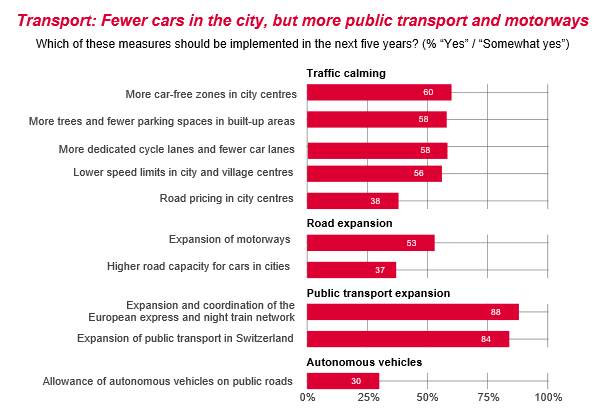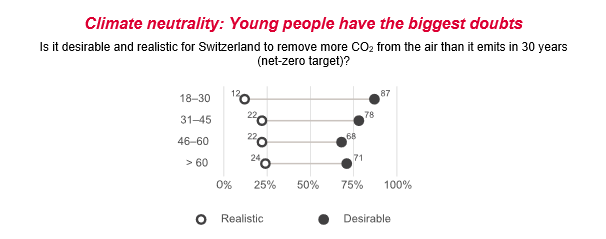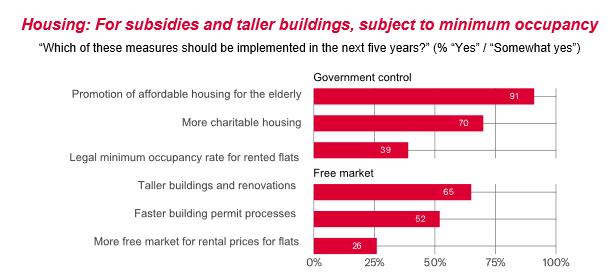Buchs, October 2023. In future, Swiss cities will have fewer cars and more mixed-use spaces, affordable flats and taller, densely populated buildings. These are the findings of the “Future Vision of a Sustainable City” opinion poll carried out by the Sotomo research institute on behalf of DPD Switzerland. Some respondents’ expectations for the next 30 years are pessimistic. Climate action is strongly supported, but only 13 % of people between 18 and 30 years of age believe that the statutory net-zero target can be accomplished.
How does the population see Swiss cities in 30 years’ time? What might a sustainable future look like? What action should be taken today in the areas of mobility, space, climate and living? In June 2023, the Sotomo research institute conducted an online survey of 2’269 people in German-speaking and French-speaking Switzerland on behalf of the parcel service provider DPD Switzerland. The weighting of the data makes the study representative.
Six out of ten people are in favour of short-term measures to restrict private motorised transport in cities. Approval is particularly pronounced among women. There is majority support for car-free zones (60 % “Yes” / “Somewhat yes”), the removal of parking spaces in favour of trees and green spaces, dedicated cycle lanes at the expense of car lanes and lower speed limits. Road pricing only enjoys majority support from 38 % of respondents and in major cities.

Among those who drive very frequently, two out of five would like to see more of a reduction in urban traffic. However, this group is also fundamentally in favour of reallocating road space so that it is not designed purely for cars. This is shown by a comparison of visualizations that the interviewees had to assess. The scepticism towards traffic-calmed cities is greatest not in the countryside, but in the conurbations. But here too, a narrow majority is in favour of more trees instead of parking spaces and additional cycle lanes.
While the aim is to restrict urban traffic, more than half of respondents (53 %) would like to see increased motorway capacity between and around cities. There is almost a consensus across party lines and geographical origins regarding the expansion of public transport in Switzerland and the European express and night train network.
Only 20 % believe in the net-zero target
Various measures to achieve climate neutrality are supported by a clear majority: Subsidies for energy-efficient building renovations (80 %), mandatory solar panels for new buildings and renovations (69 %) and a levy on CO2 consumption in the construction industry (56 %).
Only 21 % of respondents believe that Switzerland will remove more CO2 from the air than it emits in 30 years’ time (climate neutrality). Young people are particularly pessimistic about this: Just 13 % of 18 to 30 year-olds believe that this net-zero target can be reached in the next 30 years. According to the Climate and Innovation Act adopted in the referendum on 18 June 2023, the target must be reached by as early as 2050.

An analysis by party affinity shows that two thirds of Swiss People’s Party and Free Democratic Party voters also support the subsidisation of energy-efficient building renovations.
A new national park in the Alps to compensate for overcrowding in city centres is gaining support across the political spectrum, whereas the use of misting systems to cool inner-city areas in the summer has failed to gain the support of any of the parties. Even in the big cities, only two out of five people are in favour of misting systems.
Large majority in favour of promoting affordable housing in city centres
40 % of those surveyed fear that city centres in major Swiss hubs will develop into exclusive zones without affordable housing over the next 30 years. There was also very clear support for various countermeasures, ranging from the promotion of affordable housing for the elderly (91 %) and charitable housing (70 %) to taller buildings (65 %) and a restriction on the possibility of appealing against construction projects (52 %).
Only a quarter of those surveyed are in favour of more of a free market for rental prices for flats. While women tend to favour state intervention in favour of affordable housing, men tend to rely on the free market. People with an income of more than CHF 10’000 tend to be opposed to additional funding.
Support for the promotion of affordable housing fades on the right wing of the political spectrum. Half of the people close to the Swiss People’s Party advocate for more charitable housing. Supporters of the Free Democratic Party (88 %) and Swiss People’s Party (85 %) also strongly agree with the promotion of affordable housing for the elderly. Government intervention to regulate the minimum occupancy rate in flats only receives majority support in the major cities.

55 % of respondents are in favour of stricter restrictions on immigration to Switzerland. Two thirds of the older respondents supported the measure, compared to one third of the younger respondents.
The full report on the “Future Vision of a Sustainable City” opinion poll can be downloaded here (only in German available):
https://www.dpd.com/ch/en/dpd-survey/.
For more information on the survey, please contact Project Manager Gordon Bühler from Sotomo:
E-mail: [email protected]
Phone: 044 515 91 24.



